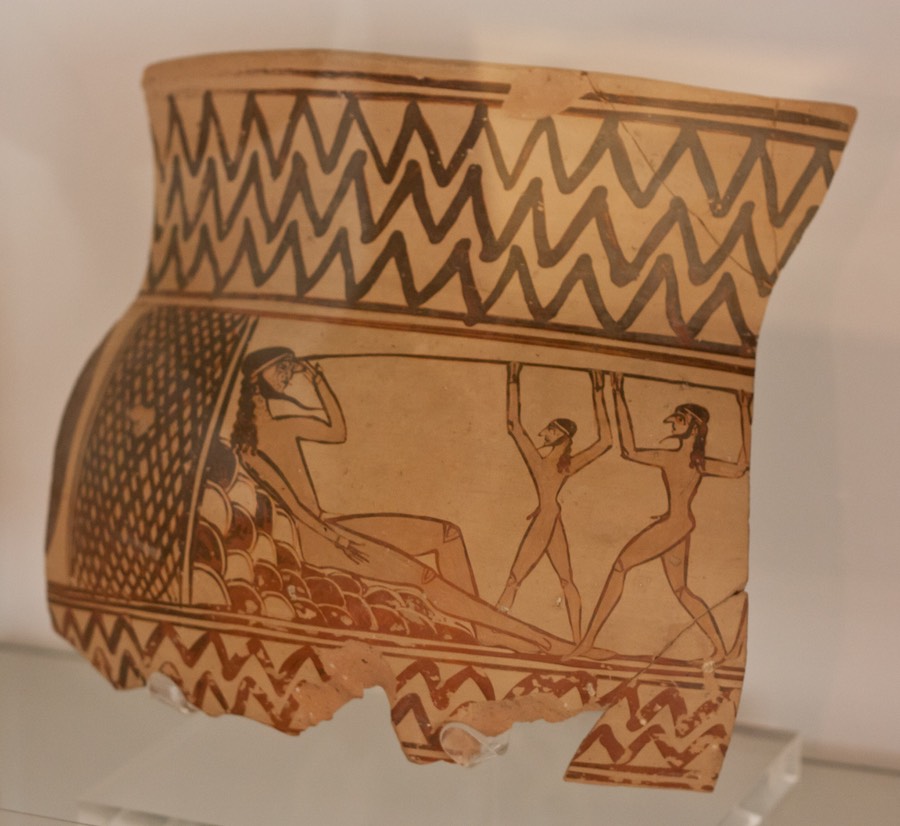Future Course / Under Construction

The Blinding of Polyphemus
Synopsis
This class will explore the mythology of ancient Greece and Rome through the writings of the ancients themselves. We will read some of the most exciting and interesting literature from the ancient world, filled with love, hate, warfare, murder, incest, adultery, and more; literature that has influenced or inspired countless authors all the way up to the present day. The literature will be complemented at all times with the art of the ancient world, so that we can see how the Greeks and Romans visualized their myths as well as read them. In Part 1 we will explore what exactly myth is, the relationship of myth and religion, and the earliest Greek myths in the writings of Homer and Hesiod. In part 2 we will look at how these myths and mythical archetypes were adapted and reinterpreted by the citizens of the Greek city-states, in particular Athens. In part 3 we will look at myth during the Hellenistic age, and how the study of myth became a scholarly pursuit for a new generation. In part 4 we will look at how the Romans absorbed Greek myth and adapted it to their own civilization. Finally, we will spend a week looking at how the modern world has taken up the myths of the ancient Greeks and reinterpreted them once again.
Workload
Reading Reactions: Students will turn in written reactions based on each day’s reading assignment. These should be about a page long, and cite at least one or two examples from the day’s reading, either directly or in paraphrase. Cite passages by line number. These reactions can be personal comments or academic observations, and should show what you have learned and what difficulties the reading presents. Don’t be vague - give specific examples! More details, and questions you might want to consider for your reactions, can be found here.
Myth Words: Every student will make a brief presentation (2-3 minutes) at the beginning of class explaining the mythical background of a modern English word. Presentations must be accompanied by an image. A list of words and other resources can be found here.
Exams: There will be a midterm and a final. Each will consist of short IDs of important mythical figures and essay questions on the major themes in mythology and how they are developed and adapted. Study guides will be available later.
Grade Breakdown:
Reading Reactions: 30%
Myth Words: 10%
Midterm: 25%
Final: 35%
Reading Materials
Required Texts:
Tripp, Edward. The Meridian Handbook of Classical Mythology. ISBN 0452009278
Fagles, Robert. Homer: The Odyssey. New York: Penguin, 2006. ISBN 0143039954
Isbell, Harold. Ovid: Heroides. New York: Penguin, 1990. ISBN 0140423559
Lombardo, Stanley. The Essential Aeneid. New York: Hackett. ISBN 0872207900
Hunter, Richard. Apollonius of Rhodes: Jason and the Golden Fleece. Oxford, 2009. ISBN 0199538727
Rutherford, Richard. Euripides: Electra and Other Plays. New York: Penguin, 1999. ISBN 0140446680
Shapiro, Alan & Peter Burian, trans. Aeschylus: The Oresteia. Oxford UP, 2003. ISBN 019513592X
Other texts will be made available online via the syllabus below.
Reading assignments
Part 1
The Beginning of Mythology
Week 1 - What is “myth”?
M: Introduction
W: Hesiod: Theogony
F: Homer: Odyssey 1-3
Week 2 - Heroes and Monsters
M: Homer: Odyssey 4-6
W: Homer: Odyssey 7-9
F: Homer: Odyssey 10-12
Week 3 - Villains and True Love
M: Homer: Odyssey 13-15
W: Homer: Odyssey 16-18
F: Homer: Odyssey 19-21
Week 4 - The Hero Triumphant!
M: Homer: Odyssey 21-24
W: Myth in early Greek art
F: Summation and review
Part 2
Myth and the City
Week 5 - Incest, cannibalism, adultery, and...democracy?
M: Aeschylus: Agamemnon
W: Aeschylus: Libation Bearers
F: Aeschylus: Eumenides
Week 6 - Mythology for Democracy
M: Sophocles: Oedipus Tyrannus
W: Myth in Classical Greek Art: The Parthenon
F: Euripides: Suppliant Women
Week 7 - Heroines and the reworking of myth
M: Sophocles: Electra
W: Euripides: Electra
F: Euripides: Medea
Week 8 - Heroes…or villains?
M: Sophocles: Philoctetes
W: Euripides: Trojan Women
F: Midterm Exam!
Part 3
Myth as Scholarly Pursuit
Week 9 - Armchair epic
M: Selections from the Library of Pseudo-Apollodorus
W: Apollonius: Argonautica 1
F: Apollonius: Argonautica 2
Week 10 - Heroes and Monsters for a new era?
M: Apollonius: Argonautica 3
W: Apollonius: Argonautica 4
F: Myth in Hellenistic Art
Part 4
Myth and the Romans
Week 11 - Roman hero, or Greek knock-off?
M: Myth in Etruscan and early Roman Art
W: Virgil: Aeneid 1-2
F: Virgil: Aeneid 4-6
Week 12 - Mythical Rome defined
M: Virgil: Aeneid 7-9
W: Virgil: Aeneid 10-12
F: The Aeneid in Art
Week 13 - Myth at play
M: Ovid: Heroides 1
W: Ovid: Heroides 2
F: Summation and Review
Part 5
Myth and Us
Week 14
M: Myth in Art
W: Myth in Literature
F: Myth in Film